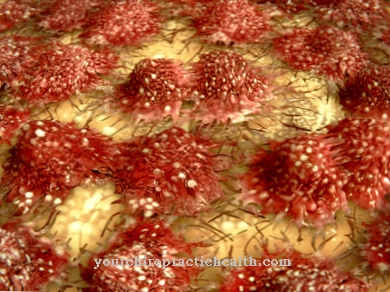Tetanus infection (tetanus) is still considered one of the most life-threatening infectious diseases. Hence the Tetanus vaccination Considered by most doctors to be indispensable for preventing illness in the event of injuries.
What is a tetanus vaccination?

The Tetanus vaccination is given to protect wounds from the risk of a highly dangerous tetanus infection, which can be fatal in one third of cases. This disease causes cramps and paralysis when tetanus bacteria have entered the body through a wound.
Tetanus bacteria (Clostridium tetani) are present as spores everywhere in our environment, e.g. in earth, dust, wood and on the skin, as well as in animal excrement. These bacteria can only thrive in the absence of oxygen, so covering open wounds can encourage infection. The tetanus disease is triggered by a toxin released by the bacteria.
With the tetanus vaccination, tetanus is injected into a muscle, a vaccine that protects against toxins (tetanus toxins) by neutralizing their harmful effects. Even if there is insufficient vaccination protection in the event of an injury, a quick tetanus vaccination can usually prevent infection. A tetanus vaccination as prevention and protection is particularly important because there is currently no antidote to tetanus.
Function, effect & goals
Without one Tetanus vaccination there is a constant risk of becoming infected. The Standing Vaccination Commission (STIKO) therefore recommends a basic immunization and regular refreshments, because the vaccination protection obtained only lasts for a certain period of time. In the case of a fresh injury, a booster vaccination is recommended for those aged 60 and over if the last tetanus vaccination was more than five years ago. People who are injured and not vaccinated should see a doctor immediately to get a tetanus vaccination.
The basic immunization of three vaccinations takes place at intervals of at least four weeks and is usually carried out together with other vaccinations as early as infancy. If it is missed, it can be made up later. If a complete basic immunization has been carried out, it does not have to be repeated for life.
However, the tetanus vaccination must be refreshed again, first between the ages of 5 and 6, then between the ages of 9 and 17, usually combined with other important vaccinations such as those against diphtheria, whooping cough and polio. It is important that adults should also have their tetanus vaccination refreshed about every ten years.
A tetanus vaccine is injected into the muscle of the upper arm. It is a so-called dead vaccination because it only contains the weakened, harmless poison of the tetanus bacterium (tetanus toxin). This means that the vaccinated person will not be infected, but will trigger a desired defense reaction in the body. The tetanus vaccination causes the immune system to make antibodies against the tetanus infection. The protection rate of the tetanus vaccination is almost 100%.
Risks, side effects & dangers
The Tetanus vaccination itself cannot cause tetanus, as the vaccine only contains the bacterium's poison, which has been rendered harmless. On the other hand, the tetanus vaccination does not provide permanent protection either, so it has to be refreshed regularly, which many people are not aware of.
Older people over 60 in particular often forget when a booster vaccination is due. For this population group in particular, however, a tetanus infection is a greater risk than for younger people. In some cases, a tetanus vaccination should only be given after careful consultation with the doctor, e.g. if the person concerned suffers from a severe defect in the immune system or during treatment with drugs that weaken the body's own defenses.
The same applies in the event that a patient has already had serious difficulties after a vaccination. Caution is also advised before an operation or during pregnancy. Even if the tetanus vaccination is carried out with a dead vaccine and is therefore usually well tolerated, the stimulation of the body's defenses often results in reddening, tenderness, itching or swelling at the injection site. Other side effects are less common.
For example, those affected after the vaccination severe swelling, increased temperature or fever, headache, muscle pain or gastrointestinal discomfort occur. But these complaints usually go away after a few days. Allergic reactions are even rarer, and diseases of the nervous system have only occurred in isolated cases after a tetanus vaccination.













.jpg)

.jpg)
.jpg)











.jpg)